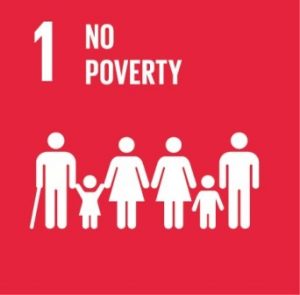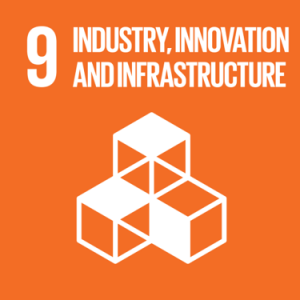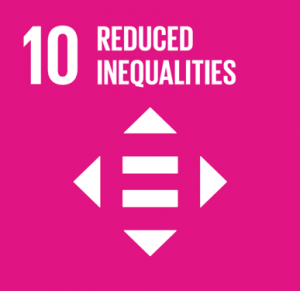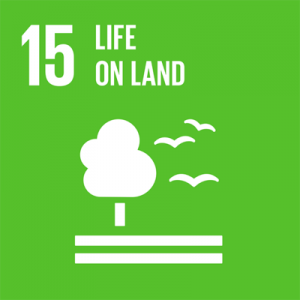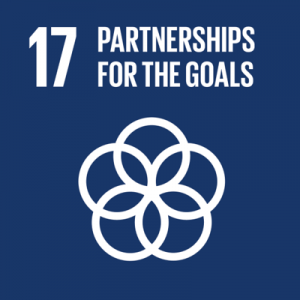SUSTAINABLE DEVELOPMENT GOALS
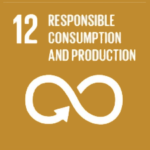
SDG 12: RESPONSIBLE CONSUMPTION AND PRODUCTION
“Much of the world’s economy is based around producing things for consumption. This drives the engine of industry. If we want the world to develop sustainably, we need to understand how to be more responsible at both ends of this cycle. This means promoting resource and energy efficiency, having a sustainable infrastructure, and providing access to basic services for all.”
(THE Impact Rankings)
Operational measures
Over the past decade, IPB University has upheld a strong institutional commitment to ethical food sourcing and supply procurement, as reflected in multiple policies implemented at the campus, community, and national levels. This commitment is reinforced through Rector’s Decree No. 133/IT3/LK/2020 (page 10, point j), which mandates the procurement of food and supply materials in an ethical manner. Furthermore, IPB ensures the integration of ethical and sustainable principles across all procurement systems through a comprehensive institutional policy framework. Students, staff, and research centers are guided by Circular Letter No. 24714/2021 (point 5a), which emphasizes sustainable and healthy lifestyles, including ethical consumption and procurement practices.

At the national level, IPB’s leadership in promoting ethical food systems is strengthened through Rector’s Decree No. 31/IT3/OT/2018, which established the Center for Halal Science Studies as a hub for research, certification, and policy development related to ethical and halal consumption. IPB University has also been officially accredited as a Halal Inspection Institution, further ensuring integrity and accountability in ethical procurement processes within the university.
To support innovation and entrepreneurship aligned with sustainability, IPB has developed the Halal Business Incubator Building within its Science Techno Park (STP), serving as a strategic infrastructure to foster research, education, and community empowerment based on ethical and responsible practices. In parallel, the Directorate of Agromaritime Community Development (DPMA) implements the Agromaritime Community Enrichment Program, focusing on nutrition clusters under the Sarjana Penggerak Pembangunan Indonesia (SPPI) Batch 2 initiative. This program provides practical applications of nutrition science through community-based dietary planning guided by the Standard Pola Pangan Ideal (SPPI).
Moreover, IPB has pioneered the Agriphotovoltaic System, an innovative integration of agriculture and solar energy production that allows farmland to be used simultaneously for crop cultivation and solar power generation, reinforcing IPB’s role in advancing sustainable and ethically responsible resource management.
IPB University demonstrates a strong institutional commitment to sustainable waste management, including the handling of hazardous waste, through a comprehensive policy framework and operational practices. This commitment is formally stated in Rector’s Decree No. 133/IT3/LK/2020 (page 3, poin m) on IPB’s commitment to the achievement of the Sustainable Development Goals (SDGs), which emphasizes the importance of managing waste in accordance with sustainability principles and environmental regulations.
Long-term strategies for waste and hazardous material management are also articulated in the Green Campus Academic Paper, further reinforced by Circular Letter No. 22015/IT3/KP/2021 (page 5, poin 6), which explicitly mandates that “each working unit is required to manage hazardous and toxic materials (B3) (page 6-17) in accordance with applicable regulations.” IPB has also established a specific Standard Operating Procedure (SOP) to ensure proper and consistent implementation of hazardous waste management aligned with the 3R principles (Reduce, Reuse, Recycle) in page 19-92. This policy ensures that all waste disposal processes are carried out safely, responsibly, and effectively, thereby minimizing potential risks to human health and the environment.
Furthermore, IPB University has established a strategic partnership with PT Multi Hanna Kreasindo Tbk, a national hazardous and non-hazardous waste management company, to develop innovative approaches in waste utilization. One notable collaboration focuses on transforming glycerine pitch waste into glycerol-based carbon catalysts, which serve as value-added industrial materials. This partnership reflects IPB’s proactive role in promoting circular economy principles and advancing sustainable industrial innovation through research-driven waste valorization initiatives.
IPB University consistently implements a systematic measurement and monitoring system for the amount of waste generated and recycled across the entire campus. This system has been in place since 2020, utilizing methodologies that refer to the Indonesian National Standard (SNI) 19-3964-1994 concerning procedures for sampling and measuring urban waste generation and composition. The Directorate of General Affairs and Infrastructure is responsible for overseeing monitoring, evaluation, and documentation processes related to waste management, guided by a specific Standard Operating Procedure (SOP). Furthermore, through Circular Letter No. 22015/IT3/KP/2021, all working units within the university are mandated to actively participate in waste management and measurement activities to ensure standardized and sustainable implementation.
As part of its integrated waste management policy, IPB University proactively measures the amount of waste generated and recycled to advance its sustainability objectives. This initiative aligns with IPB’s Green Campus framework, which serves as a comprehensive guideline for systematic waste tracking, monitoring, and continuous improvement of institutional waste management performance.
The implementation of this policy involves three core mechanisms:
1. Integrated Monitoring and Documentation:
IPB University conducts regular monitoring and systematic data recording of waste types, sources, volumes, and management methods. This includes identifying the composition of waste distinguishing between organic, inorganic, recyclable, and hazardous categories to ensure precise handling and traceability.
2. Reduction and Recycling Targets:
The policy establishes measurable targets for waste reduction and increased recycling rates. All academic and non-academic units are encouraged to adopt reduce, reuse, and recycle (3R) practices to minimize the amount of waste sent to landfills.
3. Performance Reporting and Evaluation:
Oversight of this policy is managed by the Directorate of Campus Infrastructure, Facilities, and Environmental Security (DPSPLK), which is responsible for data collection, monitoring performance outcomes, and evaluating indicators such as diversion rates and recycling percentages. The evaluation results are used to refine waste management strategies and improve overall sustainability performance.
To further strengthen its environmental management system, IPB University has developed Standard Operating Procedures (SOPs) and established a Wastewater Treatment Plant (WWTP) to handle hazardous waste, demonstrating the university’s commitment to a holistic and sustainable approach to environmental protection.
In addition, IPB University, in collaboration with the Ministry of Social Affairs of the Republic of Indonesia, has launched an eco-friendly stove innovation that utilizes palm oil waste as a renewable fuel source. This technology converts decomposed palm fruit residues into efficient and sustainable energy alternatives, exemplifying IPB’s integration of research, innovation, and sustainability to reduce environmental impact while supporting circular economy initiatives.
IPB University has implemented a comprehensive policy on plastic use minimization as part of its strong commitment to sustainable campus practices and responsible waste management. This commitment is formally articulated in the Rector’s Decree No. 133/IT3/LK/2020 (page 10, point n), which explicitly mandates the reduction of plastic waste generation across all university activities. Furthermore, Circular Letter No. 24714/IT3/HM/M/B/2021 (page 5, point 3.ii.vi) specifically encourages all members of the academic community to replace plastic bags with environmentally friendly alternatives such as eco-bags in their daily activities.
To ensure institutional alignment, IPB also extends this policy to its business partners and outsourced service providers. Through Circular Letter No. 13667/IT3/TU/2019 (page 3), the university requires all supporting business units and partners operating within the campus area to progressively eliminate the use of styrofoam and plastic packaging. These measures form an integral part of IPB’s Green Campus Program, which aims to advance sustainable development and foster an environmentally conscious campus culture.
The university’s plastic reduction policy encompasses several strategic pillars:
- Restriction on single-use plastics in all campus operations, encouraging the adoption of recyclable or biodegradable alternatives.
- Waste minimization at the source, through reduced packaging, eco-friendly procurement, and promotion of reusable materials.
- Awareness and behavioral transformation, fostering a sustainability-oriented mindset among students, staff, and the broader IPB community.
Through these initiatives, IPB University reaffirms its institutional commitment to reducing plastic waste generation and supporting the achievement of the Sustainable Development Goals (SDGs), particularly in environmental sustainability and responsible resource management.
In addition to institutional policies, IPB University actively engages in community-based and student-driven initiatives that reinforce its commitment to plastic reduction. Through the Plastic Watch Program, funded by YPBB and WWF, IPB implements awareness campaigns and tangible actions such as the installation of water refill stations and the promotion of plastic-free dormitories.
Student-led innovations further strengthen this commitment. IPB students have developed eco-friendly paving blocks made from recycled plastic waste, demonstrating the university’s focus on transforming waste into valuable resources. Similarly, the Agrometeorology Student Association (Himagreto) organized a plastic waste exchange program, encouraging students to trade plastic waste for food as a creative effort to raise climate awareness and reduce single-use plastics.
In celebration of its 61st Anniversary (Dies Natalis), IPB University also promoted sustainable lifestyle practices by replacing disposable plastic bottles with refillable water gallon stations throughout the event. Moreover, vocational students established the “Berseri Waste Bank” in Sukasari Village to enhance plastic waste segregation, recycling practices, and community empowerment through circular economy initiatives.
Through these combined efforts encompassing institutional policy, behavioral change, innovation, and collaboration IPB University demonstrates a holistic and measurable commitment to reducing plastic dependency, fostering environmental responsibility, and contributing meaningfully to the global sustainability agenda.
IPB University has established a strategic policy to minimize the use of single-use items, demonstrating the institution’s commitment to implementing sustainable campus principles. This policy is formalized in Rector’s Decree No. 133/IT3/LK/2020 (page 154, point k), which emphasizes the importance of reducing plastic and single-use containers throughout the campus. Further support is provided through Circular Letters No. 12905/IT3/TU/2019 and No. 24714/IT3/HM/M/B/2021 (point 3(ii)), mandating that all canteens and campus business units adopt reusable tableware and containers as replacements for single-use products.
As part of the Green Campus initiative, IPB actively encourages all academic, administrative units, and campus business partners to implement environmentally friendly practices by reducing dependence on single-use materials. This policy is structured around three main pillars:
- Reduction of single-use items: IPB consistently limits the use of disposable plastics and paper while promoting the adoption of reusable alternatives across campus activities.
- Waste reduction targets: Through a comprehensive waste management strategy, IPB seeks to minimize waste at its source, encouraging the university community to transition toward sustainable materials.
- Environmental awareness enhancement: IPB strengthens a culture of sustainability through continuous socialization and educational programs that foster habits of reducing single-use consumption across all campus community members.
The implementation of this policy forms an integral part of IPB’s long-term strategy to reduce waste volume, improve resource efficiency, and cultivate a culture of environmental responsibility throughout the campus ecosystem.
To operationalize these policies, IPB has established Drinking Water Stations across campus to reduce single-use plastic bottle consumption. According to the IPB Waqf Report 2024, 23 units are operational at 14 locations across IPB Dramaga and IPB Gunung Gede campuses. This initiative not only contributes to reducing plastic waste but also enhances access to clean drinking water and generates average savings of IDR 73,333 per person per month.
Beyond institutional policies, IPB strengthens innovation and community engagement through student participation. Through IAAS LC IPB, the university conducts Youth Action on Climate Transformation (YACT) workshops that equip students with skills to transform plastic waste into economically valuable crafts. In parallel, students have developed Lamero, an eco-friendly wall panel made from plastic waste, palm fronds, and sago pulp. These innovations reinforce single-use reduction efforts by converting waste into durable, functional, and high-value products.
Through its policies, facilities, and student-led innovations, IPB University demonstrates measurable commitment to responsible consumption and production, aligning with Sustainable Development Goal (SDG) 12 and strengthening its role as a model green campus committed to long-term sustainability.
IPB University has established a comprehensive policy to minimize the use of plastics and single-use items, extending its implementation not only to the academic community but also to outsourced services and business partners within the university’s supply chain. This commitment is formalized through Circular Letter No. 13667/IT3/TU/2019, which mandates all business partners and service providers operating within IPB to reduce the use of single-use plastics. Furthermore, Circular Letter No. 24714/IT3/HM/M/B/2021, Section (ii) point (xi), directs the university and its partners to prioritize products from environmentally responsible and nature-conscious producers.
All campus vendors, particularly those in the food service sector, are required to utilize reusable equipment and containers while complying with IPB University’s sustainability guidelines. This policy ensures that environmental responsibility extends beyond the university’s internal community, generating a broader impact across its business ecosystem and supply chain.
The policy encompasses several strategic components:
- Expectations for suppliers and business partners. IPB encourages all units to collaborate with suppliers who align with the university’s sustainability objectives, particularly in reducing single-use materials and promoting the use of recyclable or biodegradable alternatives.
- Compliance among outsourced services. Service providers operating on campus including food vendors and cleaning contractors are required to adhere to IPB’s waste management and environmental standards, implementing the principles of reduce, reuse, and recycle (3R) in their daily operations.
- Environmental standards in procurement. IPB emphasizes the integration of environmental considerations in all procurement processes, ensuring that every economic activity connected to the university contributes to its Green Campus vision and supports the broader Sustainable Development Goals (SDGs).
Through the expansion of this policy framework, IPB University reinforces its commitment to environmental sustainability, ensuring that eco-conscious practices are not limited to on-campus activities but are also embedded throughout its partnerships and external supply networks.
IPB University’s environmental and sustainability policies extend to key suppliers within its supply chain, including stationery and equipment providers as well as construction contractors. This commitment is formalized through Circular Letter No. 17960/2019, which outlines several strategic principles:
- Sustainable Procurement: IPB prioritizes suppliers who demonstrate environmental responsibility, favoring partners that provide eco-friendly products such as reusable, recyclable, or sustainably sourced materials, particularly for stationery, equipment, and consumables.
- Green Construction and Infrastructure: In campus development projects, IPB emphasizes the use of sustainable materials and construction methods. Contractors are encouraged to minimize waste, utilize environmentally responsible resources, and adopt sustainable practices throughout both construction and renovation processes.
- Alignment with Campus Environmental Policies: The university’s commitment to waste reduction and sustainability is reflected in its procurement system. All units are expected to select suppliers who adhere to eco-conscious principles, ensuring that sustainability standards applied internally are mirrored in external partnerships.
While specific requirements may vary by contract, IPB universally encourages all suppliers to implement environmentally responsible practices, thereby supporting the university’s broader sustainability objectives and reinforcing a culture of responsible consumption throughout its operations.
Proportion of recycled waste
IPB University has consistently implemented a comprehensive waste management system across its campuses, measuring and monitoring both waste generation and recycling since 2020, using methods based on SNI 19-3964-1994. This system is coordinated by the Directorate of General Affairs and Infrastructure (DUI) through the Waste Management SOP (page 2-8), with active participation from all work units as mandated by Circular Letter No. 22015/IT3/KP/2021 (Page 9, point 2), which emphasizes the implementation of the 3R principles (Reduce, Reuse, Recycle) across the institution.
The types of waste generated include paper, cardboard, plastics, wood, dry and wet organic residues, packaged food waste and styrofoam boxes, glass, metals, electronic equipment, office supplies, leaves, branches, and grass trimmings. Currently, DUI manages waste from 20 work units, with a total of 26 waste collection points throughout the IPB Dramaga campus. Specialized trucks, including a red manual truck (5.76 m³), a green hydraulic dump truck (7.2 m³), and a yellow hydraulic dump truck (5.76 m³), are deployed for efficient collection.
Since November 2014, DUI has also processed organic waste into high-quality compost. In 2024, IPB converted both organic and inorganic waste into 8,501 kg of compost and produced 137 paving blocks. Additionally, routine waste suction from the wastewater treatment plant (IPAL) forms part of the integrated waste management approach.
IPB students actively participate in sustainable waste management through creative, community-empowering initiatives. Notably, under the Ormawa Membangun Negeri (POMN) Program, Vocational students have facilitated digital waste bank initiatives in villages, improving waste management efficiency while utilizing collected waste as feedstock for Waste-to-Steam Power Plants (PLTUS). These efforts not only reduce waste volume but also promote renewable energy use and strengthen public awareness of sustainable environmental practices, highlighting IPB University’s contribution to both national and global sustainability targets.
Publication of a sustainability report
IPB University annually publishes a Sustainability Report and Supplementary Report as a separate document in addition to the University’s annual report, innovation report, and Green Campus document.
SDG 12 IN NUMBER
1162 mt
Amount of waste generated
850 mt
Amount of waste recycled
73 %
Percentage of waste recycled
RELATED NEWS
It seems we can't find what you're looking for.

